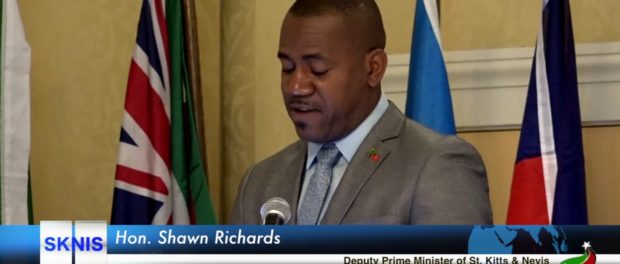TAX ADMINISTRATIONS MUST PAY KEEN ATTENTION TO THEIR RANKINGS, SAYS DEPUTY PRIME MINISTER RICHARDS
Get our headlines on WHATSAPP: 1) Save +1 (869) 665-9125 to your contact list. 2) Send a WhatsApp message to that number so we can add you 3) Send your news, photos/videos to times.caribbean@gmail.com


Basseterre, St. Kitts, July 26, 2017 (SKNIS): Deputy Prime Minister, the Honourable Shawn Richards, said that it is important for tax administrations in the CARICOM region to pay keen attention to their rankings in the World Bank Doing Business Report, as they strive to ensure that they are open and ready for business.
“This means that our countries must have an economic framework that attracts and retains investment that generates growth, creates jobs and makes a significant contribution to the public finances. Facilitating this ongoing investment rests not just on the attractiveness of the tax system but also on the certainty, stability and predictability of the operations of its tax administrations,” said the deputy prime minister, while addressing the 24th General Assembly and Technical Conference of the Caribbean Organization of Tax Administrators (COTA). “In short, the relationship between businesses and tax administrations is fundamental to the appeal of the Caribbean as a place to do business. This means we must become more customer-centric in our operations balanced by greater application of risk management in our practices.”
The deputy prime minister said that Government is keenly aware that tax reform is a robust process that requires out of the box thinking.
“We are aware that tax reform is an evolutionary process that will require resources. It will require legislative changes and technological assets, training of our administrators and education of our public as we seek to modernize the tax administrations and improve their capacity and capability,” he said. “Our present financial and economic situations create additional challenges as we attempt to move forward with an integrated and holistic tax reform agenda. However, we are incentivized by the realization that all our efforts will yield higher returns of revenue and the overall goal of developing our economies and our citizens.”
He commended COTA for adopting this years’ working theme “Promoting Voluntary Tax Compliance and Cooperation”, noting that “it would represent a paradigm shift for both administrators and especially their clients”.
“Setting high expectations often results in excellent achievements and we in the region strive also to accomplish the international standards of the public sector tax profession. I know that as practitioners in your field you understand and appreciate that any achievement of voluntary compliance relies to a large degree on the quality of the interaction between you as the administrators and your clients,” said Minister Richards. “The Canada Customs and Revenue Agency in discussing the roles and strategies of the tax administration in developing countries highlighted ‘four values to guide the tax administrators’ interaction with clients’. These were values expected to assist with voluntary compliance.”
Such values include integrity, which deals with treating people fairly and honestly; professionalism, which is to act with dedication and skill, while encouraging one to be committed in order to achieve high standards; respect, which involves having respect for clients and colleagues, as well as acting with courtesy and consideration and being sensitive to the rights of individuals; and co-operation, which build partnerships.
Minister Richards urged tax administrators to regard the above mentioned values as essential guiding principles which they can utilize to create the trust and respect necessary for accomplishing the goal of voluntary compliance and cooperation.
Leave a comment
You must be logged in to post a comment.